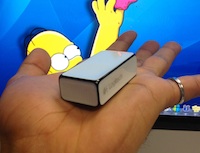Podcast: Play in new window | Embed
HOUR 2:
Tech News & Commentary
Kyle in State College, Pennsylvania listening on 103.1 WRSC asked: “Windows 8: My biggest concern is not everyone now is going to the touch devices. You have to almost “go around” to get to the standard UI. Do you think it will be still the worthy upgrade for people who don’t have touchscreen devices?”
Touchscreen features aside, Windows 8 is supposed to be a major re-work of Windows, and it’s supposed to come with many new features like the Windows store and that start screen that makes it look “touch only”.
Microsoft knows that tablets won’t make up the majority of their devices by mid-2012 when Windows 8 is expected to come out, even if this version of the operating system will run on tablets, the bigger source of income for Microsoft will still likely be Windows on computers. It’s likely that you’ll see some computer with touchscreen to take advantage of the touch functionality, but Windows 8 should be an upgrade for everyone, regardless of whether their computer has touch capabilities or not.
As for Windows 8’s touch features, that user interface (called “Metro”) really is very easy to get around. On a computer, you can still have Windows 8 come to the standard Windows desktop we all know how to use now. Even if you do boot into Metro, you can get out of it easily. Windows 8 is designed to work with touchscreen devices like tablets, but it’s still Windows and still a desktop operating system.
For more information, tune in to Hour 2 of our podcast.
“This Week in Tech History” Weekly Feature with Chris Graveline.
Amber in North Pole, Alaska asked: “I am trying to find out how a laptop can communicate wirelessly. Because after I got a virus, I got a $400 internet bill even though I only connected to the Internet for five minutes that whole month. The tech found the file that proved I was only on that long. And somehow I still got a $400 bill. And the Internet said it was “turned off” on the computer. Wondering if Laptops can dial, like a cell phone can dial, and connect that way, because it was not connected to the wall. It was a wireless connection.”
How do you pay for internet? If you have a dial-up connection something needs to be connected to the phone line, your computer can’t dial it wirelessly unless your modem allows it, but it’s unlikely you even have a separate modem for a dial up connection.
If you get charged by the data transferred, then it is possible that the virus was transferring the data wirelessly, but only if you have WiFi at home.
It’s hard to say exactly what could’ve happened without knowing how you connect to the internet, but we’d suggest talking to your internet provider, this sounds more like it may have been a billing error than a problem related to the virus, $400 is a lot of money and if you normally have to plug in your computer to connect to the internet there’s little chance that this virus managed to get around that unless you have a wireless network you don’t know about.
For more information, tune in to Hour 2 of our podcast.
Teresa asked: “This may be an odd question but as invasive as Google (browser/portal/etc) has become about collecting info, does it have access to gadgets running Google Android OS’s? Or are they completely separate entities?”
Not only are Google products running on Android not separate entities, but privacy concerns should probably be worse for Android users.
Google is going to be consolidating each users information into a single database, that means that whatever they know of you from YouTube, Gmail, Calendar, Voice, Reader, Google Search and every other service won’t sit in separate databases any more but in a single one, and it will be linked to your individual user.
Google claims they won’t track you if you’re not logged in, so computer users can get around that by either closing their Google accounts, or by logging out when they’re not using them, for users on Android that’s a harder step to take though.
Android users can use their phones without being logged into any Google service, but that their phones will prompt them to use their Google account from the time they first turn them on, logging out isn’t always easy (for example, logging out of Gmail requires going to Settings, Manage Applications and clearing the app’s saved data), and without a Google account they can’t download applications from the Android Market.
To make matters worse, an Android phone that’s signed into Google services could share other information from phone calls, to text messages, to GPS locations, and that’s another extra layer of concern that computer only users don’t have to deal with.
That being said, we have to echo the words of Scott McNealy, former CEO of Sun Microsystems, who famously said “You have no privacy anyway, get over it.” That’s a fact. Yes, Google tracks the people who use its services. So does everyone else. Apple does it, Microsoft does it, Amazon.com does it, Netflix does it. Everyone you do any sort of business with is keeping every tab on you that they can. You don’t even want to know what your credit card companies could tell someone about you.
There is only one way to be truly private in this day and age. Don’t use a computer, or a smartphone, or a credit card. Cash your paychecks at the bank they’re issued from, and spend only cash. Do not own real estate of any kind, buy all your cars with cash, and pay for all your healthcare with cash. There are entire books written on the subject of how to live off the grid, for just that reason.
Google is a big company who develops some products and acquires others. Each of these products used to have its own privacy policy. That’s a logistical nightmare for them. So they are going to have a unified privacy policy and a unified user account database. If you don’t want to use their products, then don’t. But they’re no more evil than any other technology company. The ones who claim they don’t track you… just haven’t been caught doing it yet.
For more information, tune in to Hour 2 of our podcast.
Guest in this hour:
Sean McCann, Marketing Manager at Qualcomm Atheros & Lead Marketing at Killer Technology – Qualcomm Atheros Killer Technology
With so many high-def 3D games coming out, is your computer ready to play them? Sean shares what you need to fully enjoy the latest 3D and MMO games.

PRODUCT SPOTLIGHT with Rob: “Logitech Cube”
Something we love about electronics is how most of them – not only keep adding features and shrinking in price – but they also keep shrinking in size, yet they still work. Rob’s been playing with a tiny device that resembles the appearance of a pencil eraser, yet it functions as a computer mouse.
|
 – Computer Mouse & Presenter – Works just like a computer mouse — click and scroll – Very portable. Fits in your pocket. – To save battery, there’s an OFF/ON switch. – When you lift the Cube in the air, it goes to presenter mode. You can advance your PowerPoint Presentation. Turn it upside down and click, and it will go to previous slides. – Connects to your computer wirelessly via the Logitech Unifying Receiver, which supports up to 6 compatible devices. Wireless range up to about 82 ft (25 meters) – Available in Black or White – $69.99 |
Ernie in Smithfield, North Carolina listening on WPTF 680 asked: “We have a new home that is constructed with insulated exterior concrete walls. The vapor barrier they used inside has a metallic lining in it. As a result, we cannot get cell phone signal inside the house. Is there any kind of repeater that we can put an antenna in the attic and then use cell phones inside the house?”
We talk quite a bit about this topic on our show because almost all go through bad cell phone signal reception. There are things you can install in your home. The first that comes to mind is the zBoost SOHO from Wi-Ex. This unit has a base station that you place in whatever part of the home you have the most trouble with. Then you install the antenna in a location of your home (preferrably in the attic or outside if you can) where you get the strongest signal on your phone. It comes with a 50-foot cable, so you should have no trouble reaching that area.
They have extensions available, but recommend having no more than 75 feet of cable. Now, you do need 15 feet of vertical separation between the antenna and base station. Otherwise, the signal can cancel itself out and you won’t notice any difference. If you can’t get that distance, they have other models available, like the Metro, which doesn’t require any seperation.
The SOHO model sells for about $300 and the Metro is about $200. Both of these models support multiple users, so it should help all the members of your family and anyone that comes to visit.
There are other manufacturers that make similar products. One that we’ve also talked about is Wilson Electronics. Their products are very similar in price and function, but at least in our offices and studios where we’ve used both, the Wi-Ex products seemed to perform a little better. Your setup may be different and performance may vary for you, but the Wilson products are also an option for you.
For more information, tune in to Hour 2 of our podcast.
This Week’s Prizes for Our Listeners
Fanny Wang: Customize your own Fanny Wang noise-canceling headphones! We have a promo code for one lucky listener.
G-Technology: Several G-Drive Slim 500GB — Ultra-slim portable USB Drive
Honestech: Audio Recorder 3.0 Plus – Convert all of your music, including cassettes, LPs and 8-track tapes, into MP3s, WAV files, audio CDs and MP3 CDs, and listen to them on your portable music players.
ZAGG: ZAGGkeys FLEX Tablet Keyboard & Stand – A versatile standalone Bluetooth keyboard for smartphones and tablets. An $80 value.

